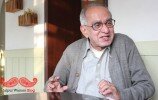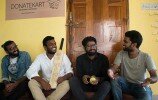JWB Finds Out What Namita Gokhale Left Behind In Her Latest Novel
- JWB Post
- November 28, 2016
“Before writing this novel, I asked myself, ‘Do I need to write this book? The world can do without another book from Namita Gokhale.”
“‘One story is left unsaid’ something within me answered,” mentioned Namita Gokhale, yesterday, at the Book Launch event organized by Siyahi, of her latest (and apparently the most ambitious) creation: Things To Leave Behind.
Namita’s is a name that barely needs any introduction. Other than being the founder of Jaipur Literature Festival, Crime Writers Festival, Mountain Echoes Literary Festival, founding director of Siyahi, director of Yatra Books, and author of 14 books, she is a nurturer of ideas and creativity.
So, when such a noted personality introduces a novel as her most ambitious one, I’ve got to say, the curiosity bar rises pretty high. Hence, there were we – an audience charged with literary enthusiasm – listening to Namita Gokhale in conversation with Pramod Kumar KG.
“I saw the book in a pdf format. I read it without the blobs and jacket text that it is wrapped in now. And I have to say; there is a wonderful depth of history even though it is a work of fiction,” Pramod said. “Plotted in the Kumaon region in the time frame of 1840-1912, the stories of the women are spoken so emphatically, that it is impossible to understand and learn the region unless you’ve been there!” he added.
“And yet, I don’t see it as a women’s book at all. I see it as a story of men and women. It is a book with so many characters that there is something for everyone in it,” Namita mentioned at some point in the conversation.
Which point, I’ll tell you as soon as I remember. *Facepalm*
Btw, did I tell you that the novel derives a lot of its pieces from a brain-shelf of Namita’s childhood memories? She grew up in the Kumaon region; there sure must be an abundance of those!
A little while into the session and I came to know that the personal memory is just one of the many sources. There are references from authors as diverse as Rudyard Kipling to Pandita Ramabai, from texts as varied as the Bible to the Himalayan Journals to the Manaskhand to a lovely poem on a hot-air balloon on the Internet!
“My research is rough, and turns up when I need it,” Namita chirped in after which she read a little passage here, a big paragraph there from the book, and said:
“This novel is written from several points of view. Sometimes my language and my gaze are that of colonial British, at other times it is of the Indians who are reacting to the strange phenomenon of people from a distant country turning up and telling them what everything is about.”
Just then, Pramod took up a particular phrase that intrigued him a whole lot. He said, ”One of the characters dies in the lake, and the entire village is happy for her sacrifice calling her an ‘expendable widow.’ That is an extraordinary line to put into a book. It makes one realize the ways in which women’s lives were considered in several regions of the country.”
Before he could continue any further, Namita interrupted his speech replacing the “were” with an “are.” “The way women’s lives are considered in several regions of the country.”
“So, do you think that is the way life still is across the country or has it changed?” Pramod enquired.
“I can’t say about the whole country. I’ve grown up in Kumaon. There, every year one or two people drown themselves in the lake to commit suicide, and everybody would say “bali leli is biwi ne.” The villagers were in fact quite relieved about it. So, the line is probably from a distant memory I have of such things happening when I was growing up,” Namrata answered.
While I was still recovering from the sting of the aforementioned phrase, Pramod went on to say that even though there are huge elements of history deeply embedded in the story, it is still a fast read and a gripping tale.
“This is a love story, and it is funny! Don’t get taken in by Pramod’s intellectual interpretations!” Namita chuckled, and the audience followed suit.
It was time for the Q & A session next, and I was excited to be sitting next to a woman who asked Namita about the back story that led to the title: Things To Leave Behind.
Turns out, there really was an interesting story here. “The idea for the title came upon me when I was in Les Comores. I had stayed there for more than a month and had an economy ticket back. The things to pack piled up and I looked at them and thought that all this was never gonna fit in that suitcase. So, I took a piece of paper, and I made out a list: Things to leave behind. And then I thought, this sounds really nice! And there it was!”
Me
While just about everyone in the audience flashed a smile, Namita continued to the deeper meaning of the title.
“In my mind, things to leave behind have two meanings – the things that we leave behind but don’t discard as we move on in life. Another meaning refers to the things we actually leave behind.”
Taking this as the cue, I asked the question I’d been waiting to ask, “In the process of writing this book, which piece of yours did you leave behind, Namita?”
To which, she happily replied, “In the third part of the book, the imaginary Eden ashram besides the lake, the Venus shining in the sky, remind me of the stars and sky in Kumaon. They are stunning, and I have this image of the purple sky always with me. So yes, I left a bit of me in the third part of the book, and it will never go away.”
That, followed by a bit more reading from the book, brought the session to a close.
Before leaving, I went up to Mr. Pramod to get his personal and genuine remark on the book as one of its initial few readers. He said, “Perhaps the best book I’ve read this year! I am a historian, so I am going to bring a baggage of history to it, but it is a fun book. You will laugh through it. That’s what it is. Having a light touch to writing is not easy. But this book has that remarkable touch to it.”
Needless to say, that remark made me grab a copy of the book. With that, and with thoughts of a purple sky, I went home.
- 0
- 0












